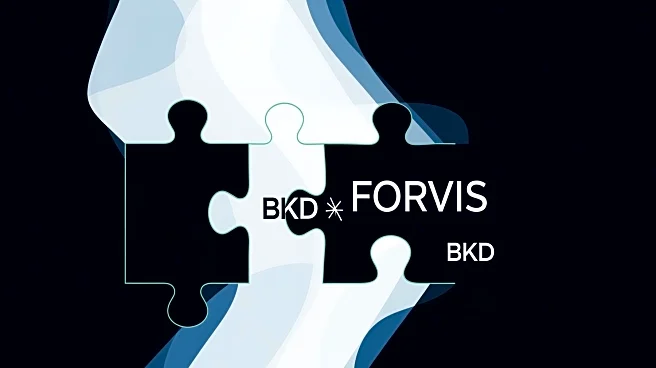What's Happening?
Dixon Hughes Goodman, a prominent accounting firm headquartered in Charlotte, North Carolina, has merged with BKD to form a new entity known as FORVIS. This merger, completed in 2022, has created one of the largest tax and accounting consulting firms
in the United States. The combined firm, FORVIS, now ranks among the top 10 in the nation, boasting over $1.5 billion in annual revenue and operating 70 offices across the U.S. and internationally. The merger is a strategic move to enhance service offerings and expand the geographic footprint of both firms, leveraging their combined expertise in assurance, tax, and advisory services.
Why It's Important?
The merger between Dixon Hughes Goodman and BKD to form FORVIS is significant as it consolidates resources and expertise, positioning the new firm as a major player in the accounting and consulting industry. This expansion allows FORVIS to offer a broader range of services and reach a wider client base, enhancing its competitive edge in the market. The merger also reflects a trend of consolidation in the accounting industry, where firms are joining forces to better compete on a national and international scale. Stakeholders, including clients and employees, stand to benefit from the increased capabilities and resources of the newly formed firm.
What's Next?
Following the merger, FORVIS is expected to focus on integrating the operations and cultures of the two legacy firms to ensure a seamless transition for clients and employees. The firm will likely continue to expand its service offerings and geographic reach, potentially exploring further acquisitions or partnerships to strengthen its market position. Clients can anticipate enhanced service delivery and access to a wider array of expertise, while employees may see new opportunities for career growth and development within the larger organization.
Beyond the Headlines
The creation of FORVIS through the merger of Dixon Hughes Goodman and BKD highlights the evolving landscape of the accounting industry, where scale and specialization are increasingly important. This merger may prompt other mid-sized firms to consider similar strategies to remain competitive. Additionally, the integration process will be crucial in determining the long-term success of FORVIS, as it will need to effectively blend the cultures and operational practices of the two firms to maintain client satisfaction and employee morale.















